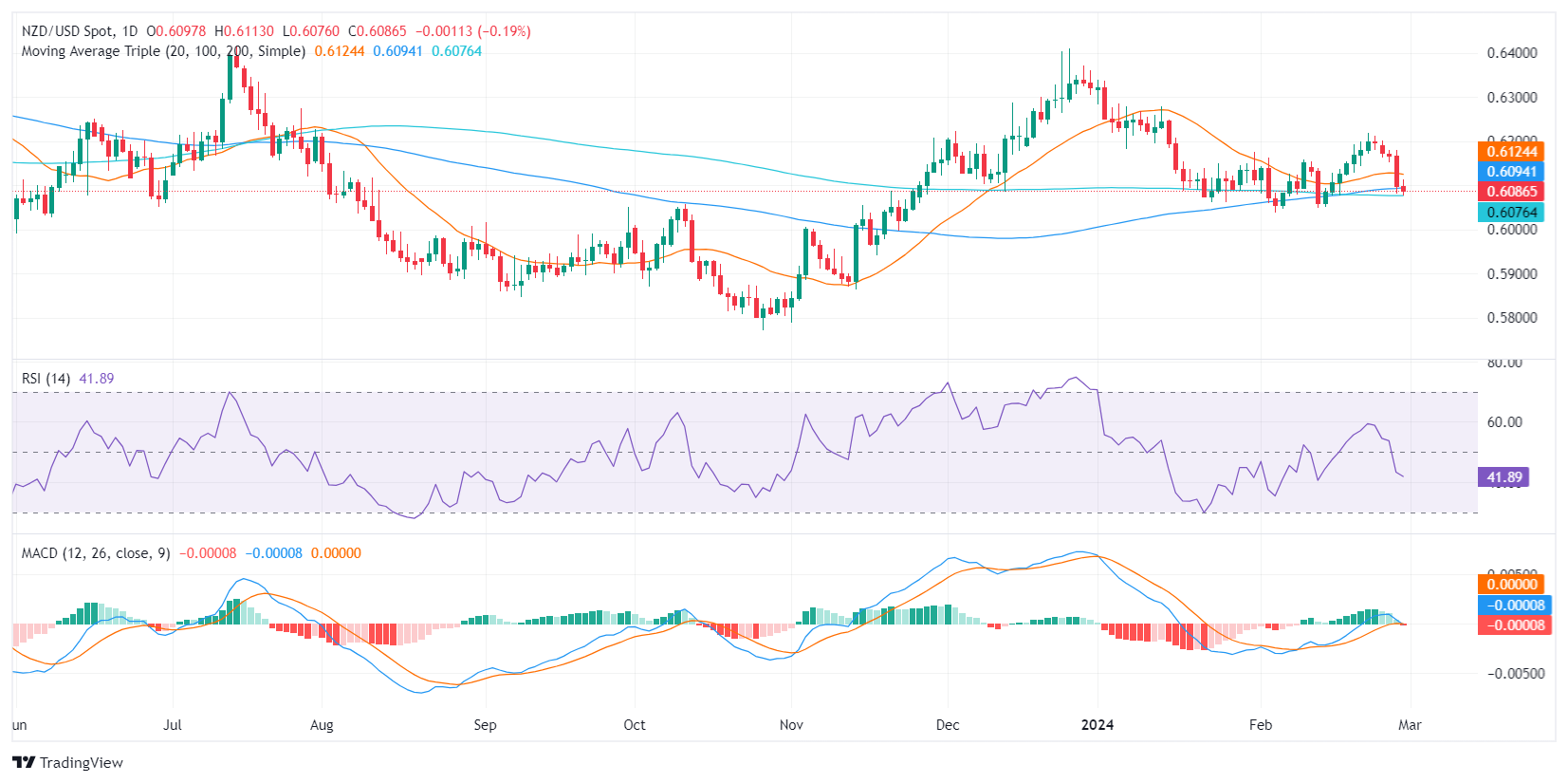- Analytics
- News and Tools
- Market News
- NZD/USD tallies a losing day, hawkish bets on the Fed cushions the USD
NZD/USD tallies a losing day, hawkish bets on the Fed cushions the USD
- The NZD/USD traded at around 0.6085 with 0.25% losses in Thursday's session.
- US inflation rate, gauged by the Core PCE Price Index fell in January, matching expectations.
- Following RBNZ’s dovish hold, if the market keeps delaying rate cuts of the Fed, more downside may be incoming.
The NZD/USD pair is currently trading at 0.6085, reflecting a 0.25% decline in Thursday’s session. Data-wise, US Personal Consumption Expenditures (PCE) showed no surprises, but markets are aligning with the Federal Reserve’s (Fed) forecast of 75 bps of easing in 2024, which is benefiting the USD.
On Thursday, the US Bureau of Economic Analysis reported that the annual inflation rate in the US, measured by the change in the Personal Consumption Expenditures (PCE) Price Index, rose by 2.4% in January, decelerating from 2.6% in December, which was in line with what markets had anticipated. The index experienced a monthly uptick of 0.3%, exactly as expected. When excluding the fluctuating sectors of food and energy, the Core PCE Price Index rose by 2.8% year-over-year, aligning with the consensus.
Regarding expectations, markets seem to have given up the hopes of a cut from the Fed in March or May and instead pushed the start of the easing cycle in June, which seems to be pushing the pair down.
NZD/USD technical analysis
On the daily chart, the Relative Strength Index (RSI) on the NZD/USD shows an overall declining trend, transitioning from the positive territory to the negative territory. This indicates a shift from bullish to bearish momentum, demonstrating a power change from buyers to sellers. This is also supported by the decreasing green bars in the Moving Average Convergence Divergence (MACD) histogram, suggesting a deceleration in positive momentum.
In terms of the broader trend, despite the pair trading below the 20 and 100-day Simple Moving Averages (SMAs), it remains above the 200-day SMA. This indicates that while there is short-term bearish pressure, the long-term uptrend hasn't been completely overruled.

© 2000-2026. All rights reserved.
This site is managed by Teletrade D.J. LLC 2351 LLC 2022 (Euro House, Richmond Hill Road, Kingstown, VC0100, St. Vincent and the Grenadines).
The information on this website is for informational purposes only and does not constitute any investment advice.
The company does not serve or provide services to customers who are residents of the US, Canada, Iran, The Democratic People's Republic of Korea, Yemen and FATF blacklisted countries.
Making transactions on financial markets with marginal financial instruments opens up wide possibilities and allows investors who are willing to take risks to earn high profits, carrying a potentially high risk of losses at the same time. Therefore you should responsibly approach the issue of choosing the appropriate investment strategy, taking the available resources into account, before starting trading.
Use of the information: full or partial use of materials from this website must always be referenced to TeleTrade as the source of information. Use of the materials on the Internet must be accompanied by a hyperlink to teletrade.org. Automatic import of materials and information from this website is prohibited.
Please contact our PR department if you have any questions or need assistance at pr@teletrade.global.















